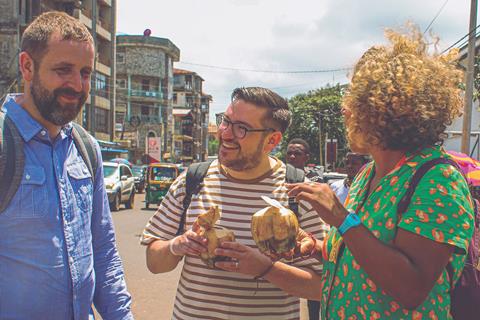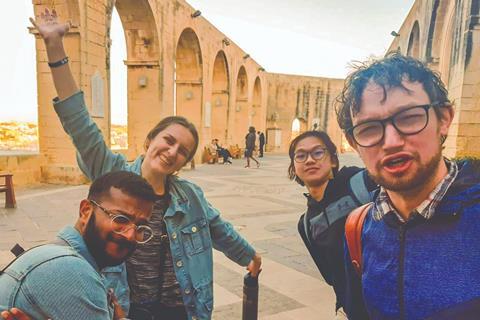Short-term mission has come under heavy criticism in recent years, with concerns ranging from white saviourism to doubts over motivations and priorities. But Heather Tomlinson discovers another side to the story
Since the beginnings of modern Protestant missions, credited to William Carey taking his first steps in India in 1793, travelling to exotic destinations for the sake of the gospel has been widely celebrated. Stories of sacrifice, courage and adventure have inspired many.
Perhaps it was this glamorous image that drew Christians into short-term mission (STM), assisted by the advent of cheap air travel which, by the mid-20th century, made a fortnight on the other side of the world a realistic possibility. The number of these trips, which typically see churches send groups of people oversees to evangelise in word and deed, have grown “exponentially” since the 1960s and 70s, according to Liberty University research published in 2009, through the growth of agencies such as Youth With A Mission (YWAM) and Operation Mobilisation (OM).
But that paper also outlined the emerging criticisms of STM, which have become more popular over time.
In 2012 The Gospel Coalition published a harsh analysis: ‘Why You Should Consider Canceling Your Short-Term Mission Trips’ by Darren Carlson, now pastor of Redeemer Church in Montana. He argued that STM can harm host communities, promote dependency and be motivated by a self-serving attitude.
In the UK, the Global Connections group have established a code of conduct, now called the STM Commitment to Best Practice (CtBP), which encourages mission agencies to consider the needs of all participants and addresses some of the common problems and criticisms.
Nevertheless, the Baptist Missionary Society (BMS) closed down its STM programme in 2022, citing a concern for “true intercultural partnership” with the Global South rather than sending “affluent” people short term which creates “imbalances of financial power”. Now it only offers short-term opportunities for specific, highly qualified roles that have been requested by the host community, and where there are no local people with those skills.
Even OM – an STM pioneer – has dropped the term and uses “short-term outreach” instead, while another Christian organisation, Frontiers, emphasises that short trips are to “test the water for long-term ministry” rather than offer practical help.
Are we witnessing the end of the short-term mission trip? Or do such initiatives still have a place?

Poor motivations
A common criticism is that attendees or sending churches focus on what they get rather than the needs of the communities they visit. At worst, cynics say STM is for tourists to feel good about themselves or virtue signal on social media.
The influential Christian book When Helping Hurts (Moody) by Brian Fikkert and Steve Corbett argues that the West needs to “walk with” the poor in “humble relationships”. The authors established the Chalmers Center to advise churches on how to do short-term mission “without causing long-term harm”. Resources include a free photography and social media guide for use during STM, which includes asking for permission before taking or posting photos.
People need to be reached. It can be for one hour, one day or one week, but we must not undermine the power of God
Yet when a visiting team has a loving, servant-hearted attitude, it encourages and inspires. Writing on the Chalmers blog, Corbett recalled a “memorable” short-term team who had a “spirit of humility” when they visited his long-term project. “They came with open minds and hearts, wanting to better understand poverty alleviation in the South American region in which we worked”, he wrote. “They politely declined invitations to [lead, teach or preach], deferring to the leadership of local pastors. They came to simply be with us.
“They unleashed our local staff to engage in transformational work that simply couldn’t have happened otherwise. Their trip was a huge success. Thinking of my time with them still puts a smile on my face.”

Distraction from long-term mission
A number of commentators have also expressed concern that STM diverts resources away from the more important long-term ministry essential for discipleship. Therefore, churches are advised to prioritise long-term work and organise STM in consultation with missionaries and local people. “God’s mission is not to make converts but to make disciples – an inherently and inevitably long-term undertaking,” says Chris Howles, director of cross-cultural training at Oak Hill College, who served in Uganda for twelve years. “Short-term mission may contribute usefully to the task, but it shouldn’t be routinely prioritised over and above the sometimes mundane but normally more effective work of long-term mission partners cultivating long-term ministries in the context of long-term relationship.”
Yet there are many stories of people who felt called to long-term mission while on STM. For example, Georges Houssney, the Lebanese founder and director of Horizons International, credits STM for inspiring a love for Muslim people in him, which has led to a lifetime in mission and overseeing a modern translation of the Bible in Arabic. When he was 17, he visited Jerusalem with OM, a trip that he says was “very significant” for his future. “I gained a heart for the peoples of the world,” he wrote on the Biblical Missiology journal blog. “The trip challenged me to think outside my Lebanese box and to expand my vision to include all the peoples of the world, particularly Muslims. However, it was not until I had made several short-term trips to a number of countries that my vision for the world took root.”
Harmful activities
Carlson’s Gospel Coalition article painted a sorry picture of the fruitless church activities he had witnessed or heard about: “Houses in Latin America that have been painted 20 times by 20 different short-term teams; fake orphanages in Uganda erected to get Westerners to give money…a New England-style church built by a Western team in Cameroon that is never used except when the team comes to visit…teams of grandmothers who go to African countries and hold baby orphans for a week every year but don’t send a dime to help them otherwise” and other horrors.
I could share story after story of changed lives as a result of short-term missions
Elsewhere, there are terrible tales of mission that went very, very wrong. For example, one young American woman hit the headlines when she started a medical centre in Uganda in 2009 but supposedly allowed untrained people to treat patients, prompting a lawsuit alleging the charity’s actions had led to the deaths of children.
Short-term evangelism can be “damaging, a waste of money and an unnecessary phenomenon,” says Mekdes Haddis, an Ethiopian living in the US and author of A Just Mission (IVP), but she still does not rule it out, pointing to her own support of a team that carries out “appropriate” long-term discipleship. “This type of work takes years and years of dedication, a love and calling to a specific group of people and a sincere desire to know and understand their history and culture”, she wrote in Faithfully magazine.
Lauren Dixon, who leads global missions at Agapé UK, part of Campus Crusade for Christ International, told Premier Christianity it is “over-simplistic” to treat all STM as the same. “Humility, cultural intelligence, acknowledgement of power dynamics and a servant posture help safeguard the peer-partnership between a short-term mission and a local partner. I could share story after story of changed lives as a result of short-term missions.” (See box for two such stories.)
Oak Hill’s Howles also had positive experiences of receiving more than 36 STM teams while in Uganda. “Each of them arrived with cultural sensitivity and a godly eagerness to learn and serve,” he says. “We attribute this in God’s kindness to the way that those teams were carefully constructed, prepared and deployed.”
Lives transformed through short-term mission
Turkey: From Islam to Christianity
I came to faith in 1991 when I was a student in Turkey. Three American students came for their first mission trip to start a campus ministry among Muslim students. They shared the gospel with me, and we became friends. They stayed for around five or six weeks, and I visited them in their house. We spent some social time together and I experienced true love, acceptance and grace while I was with them. The Lord opened my heart, and I became one of the first Christian students at the campus. Before they left, they introduced me to long-term American missionaries. They discipled me and connected me to the Turkish church.
The Lord called me to full-time ministry in 1995. I worked with hundreds of short-term missions from various organisations and churches. My experience overall is very positive. Sometimes Western culture analyses too much. People who do not know Jesus need to be reached. It can be for one hour, one day or one week, but these times are very precious. We must not undermine the power of God for short-term missions.
Ahmet (name changed) has worked with many STM teams and is currently a missionary
The former Soviet Union: From spiritual ignorance to receiving Christ
The first time I ever heard the gospel I was 18. Two American students from an Agapé summer mission team approached my classmates and me on campus in the former Soviet Union. We were eager to chat, and they shared the good news with us. To be honest, I don’t remember much of what they shared; I simply didn’t understand. The message was so completely new – the concepts so unlike anything I had heard before. I had no concept of who Jesus was or what the Bible said.
There were students who loved Jesus and loved people, and they came to the former Soviet Union to live for a month around students like me. I think that was the biggest thing that impacted me. I literally spent every single day with them during the project, just learning about one another, having deep conversations and just having fun.
A couple of months later, I prayed to receive Christ. From the abyss of spiritual ignorance to a heart that longed to know him. There were a few things that impacted me most: their love for God, their love for one another and their love for me. They took genuine interest in getting to know me and my friends, they spent time with us and were patient with our questions. It was very meaningful to us that they were young people just like us, open for new friendships.
For me it didn’t start with genuine interest in God. It started with connecting with people who, by opening their lives, helped me know who Jesus was and then to make a step to know him personally.
Lena grew up in the Soviet Union and became a Christian following a month-long student outreach at her university. She has worked in mission for more than 20 years with Agapé

White saviours
As concerns about social justice have increased in the Western Church in recent years, a much-debated concern is the controversial term “white privilege”, and the danger of assuming Western cultural superiority. Some allege that STM is carried out with a patronising attitude or a “white saviour complex” of rescuing ethnic minorities.
Ironically, this is often a “Western concern” not held by the communities being served, according to Jude Daniel, field director of Agapé UK. “I had never heard of [white saviourism] in our church in India, even though we had plenty of opportunities to interact with people from the West,” he says. “We saw [STM] as a powerful expression of the gospel to see a global Church coming together to worship God and do mission.”
Short-term mission needs to revolve around sacrifice not self-help
He argues that, contrary to the negative narrative that has developed in the West, in developing countries there can be goodwill if there has been a history of positive mission, such as building schools and hospitals and instituting social reform – and bringing the gospel.
The criticism also assumes that Western churches are white, but today, many are multicultural, and mission is increasingly so. Research by the Center for the Study of Global Christianity found that within the top ten missionary sending countries in 2010 were Brazil (second), South Korea (sixth) and India (ninth). Both sending and receiving countries are a mixture of cultures from all parts of the world.
Daniel argues that “saviourism” is a trap that any community can fall into. “Remove the saviourism, not the mission,” he says. “Go with a humble attitude, learn the local culture and customs, seek to understand the history, the stories, the values and beliefs, and look for the facets of the gospel that shine best in that culture.”
Howles adds that one of STM’s “greatest potential benefits” is “bringing together diverse believers to serve Jesus” in order to “not only teach but also embody the miraculous reconciliatory work of God in the world”.
Climate concern
A final concern is the climate. A church may choose to take a hardline approach to international travel due to concerns about carbon emissions. But would participants have flown on a foreign holiday anyway? If the host country is asking for the support and input, is the potential fruit worth the cost? One option to address environmental concerns is to offset the carbon through many organisations that facilitate this by activities such as planting trees.

A better way
So, what should we make of short-term mission?
“There are pitfalls at both ends of the spectrum,” says Howles. “Some like to denigrate all forms of STM as inherently vulgar, counterproductive and harmful. Others do the opposite in implying that STM is indispensable to God’s global gospel purposes.
“The reality lies in the middle. Yes, the STM industry is a thoroughly modern and Western phenomenon that is all too commonly carried out thoughtlessly, patronisingly and insensitively. But there are also countless voices over the years – senders, sent ones and hosts – who testify to God-glorifying gospel life and church growth flowing directly from STM programmes.”
It seems most concerns about STM can be addressed through a Christ-like attitude, training, reflection, prayer, humility and listening carefully to local churches and long-term missionaries. “Short-term mission needs to fundamentally revolve around sacrifice not self-help, listening not lordship, service not adventure, learning not leadership, partnership not primacy, and suffering not self,” says Howles. “When all those characteristics are embedded in the hearts and minds of the team, the Holy Spirit can use it for remarkable things in a short space of time.”







































No comments yet